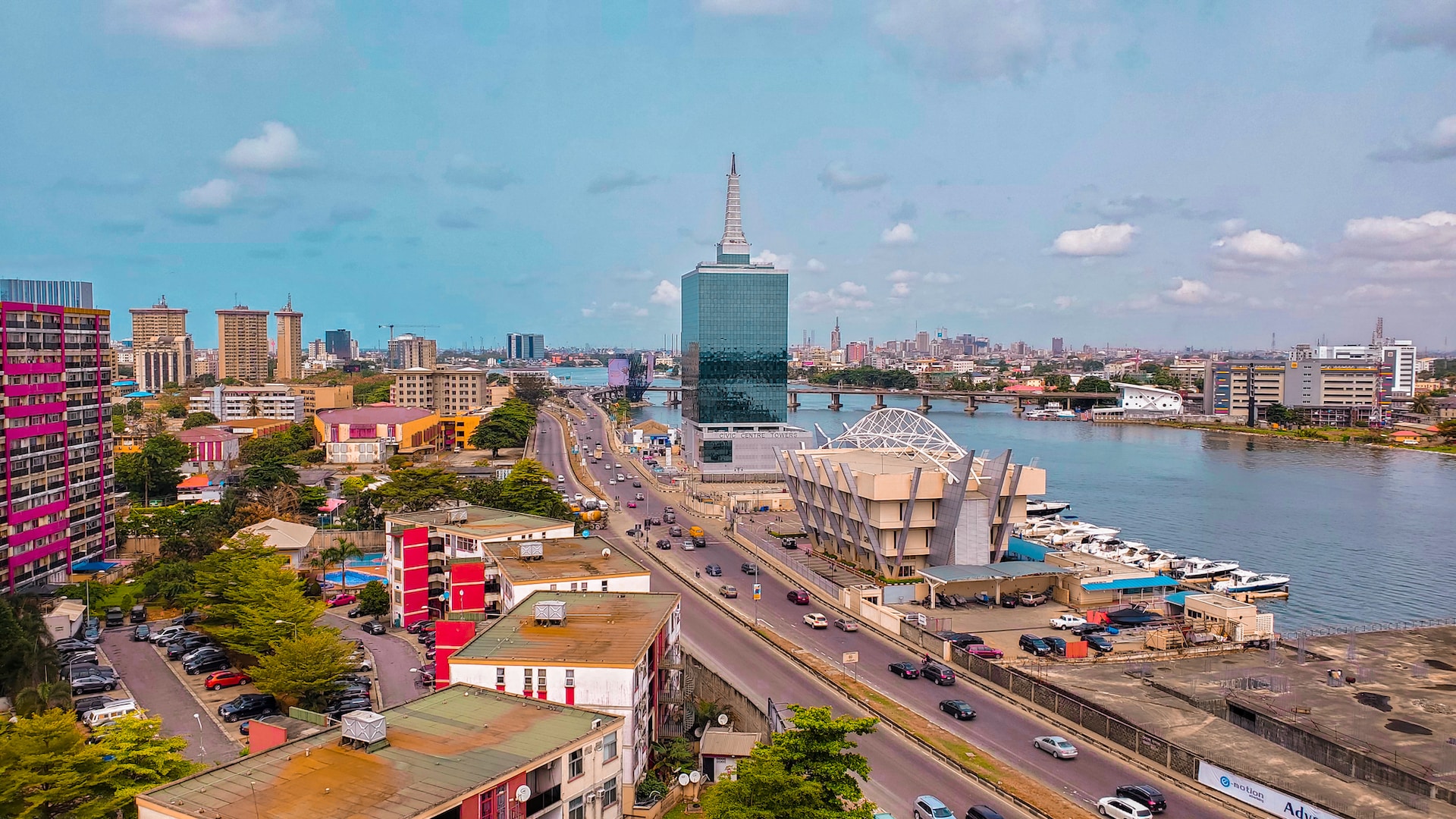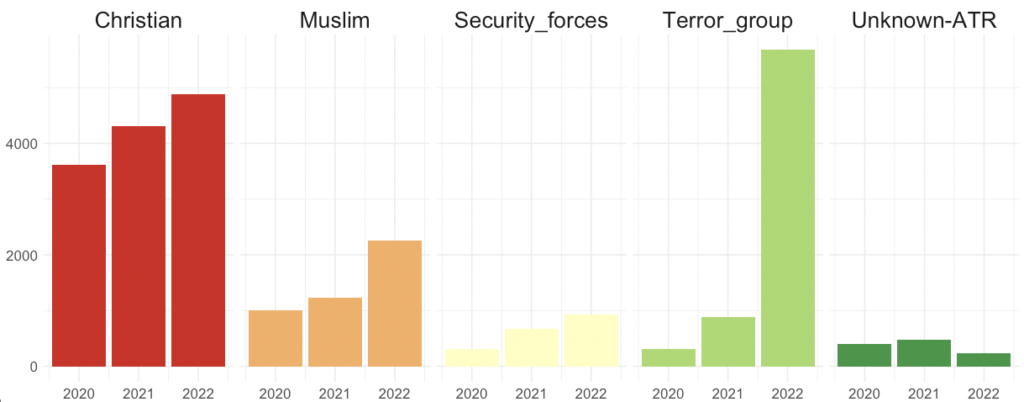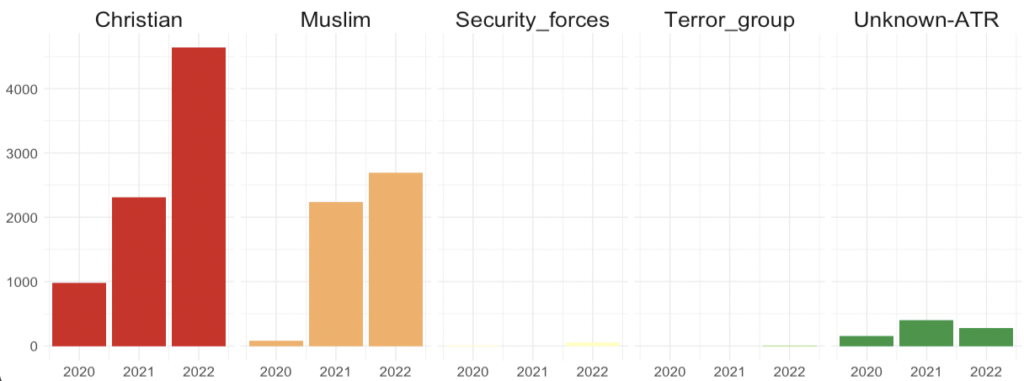
An Illustrative Approach to Religious Freedom Violations in Nigeria
Dennis P. Petri
Lagos, Nigeria by Nupo Deyon Daniel on Unsplash.
Nigeria is a multi-ethnic and culturally diverse federation of 36 autonomous states and the Federal Capital Territory. The political landscape is partly dominated by the ruling All Progressives Congress party (APC), which controls the executive arm of government and holds majority seats at both the Senate and House of Representatives in parliament and majority of the States.
The Nigerian Constitution bars the federal and state governments from adopting a state religion, prohibits religious discrimination, and provides for individuals’ freedom to choose, practice, propagate, or change their religion. The Constitution provides for states to establish courts based on sharia or customary (traditional) law in addition to common law civil courts, although civil courts have preeminence over all other courts. Sentences may be appealed from sharia and customary courts to civil courts. In addition to civil courts, sharia courts function in twelve northern states and the Federal Capital Territory, and customary courts in most of the 36 states.
Nigeria has the largest population in Africa with 224,065,885 habitants in 2023. The population is distributed among three main religious affiliations: 50% identify as Muslim, 40-45% identify as Christian (Roman Catholic, Anglican, Methodist, among others), and a minority of 5-10% practice indigenous religious traditions.
Regionally, there is a perceived cultural, economic, and political split between Nigeria’s North and South, which is a direct legacy of British colonial policy and uneven regional development. While the North is largely Muslim and the South is largely Christian, the religious demographics of the country are far more complex than the North/South binary implies. It is true that Islam is deeply entrenched in the North, with many different strands and beliefs represented from widespread affiliation with Sufi brotherhoods to Salafi interpretations of Islam that reject Sufism, small Shi’a communities, and various interactions with indigenous beliefs.
This essay aims to illustrate Nigeria’s violation of the human right to religious freedom, providing reliable data about killings and abduction of civilians related to their religious affiliation. The data was collected with a special focus on violence reported in Nigeria during the three-year period, in the context of the research performed by the Observatory for Religious Freedom in Africa, a program of the Foundation Platform for Social Transformation and a partner of the International Institute for Religious Freedom. This data spans between the following periods: October 1, 2019 to September 30, 2020; October 1, 2020 to September 30, 2021; and October 1, 2021 to September 30, 2022.
The research registered killings and abductions of civilians, including their religious backgrounds (Christian, Muslim or African Traditional Religionist), age and gender, in the context of an ongoing “culture of violence” created by “terror groups” such as Boko Haram, Islamic State in the West Africa Province (ISWAP), armed Fulani herders, “bandits” and other, smaller groups. Where possible, the research recorded the alleged perpetrators from the “terror groups.”
The data sheds light on the reality of violence in Nigeria and brings to attention fresh information about the nature and scale of religiously motivated violence in Nigeria, and the response (or lack of it) from the Nigerian government. In the context of this essay, we distinguish between the religious background of the civilian victims because a variety of contradictory analyses exist concerning the causes of violence in Nigeria, raising issues surrounding the right to the truth.
The Human Rights Situation on the Ground
Over the three years of our monitoring of killings and abductions in Nigeria, we uncovered a situation of extreme violence across the country. Over the three reporting periods, the overall total of people killed in the context of the culture of violence created by “terror groups” was 27,183– including 5,629 in the 2020 period, 7,569 in the 2021 period, and 13,985 in the 2022 period. The overall total of people abducted in this context was 13,843, including 1,224 in the 2020 period, 4,955 in the 2021 period, and 7,664 in the 2022 period. We should stress that our data gathering is conservative in its counting. It was also found that in each of the three years, Christians were disproportionally affected by violence perpetrated by “terror groups” such as Boko Haram, ISWAP, armed Fulani herders, and “bandits.”
Killings in Nigeria (The Right to Life)
Below is a summary table showing the numerical breakdown of killings that we recorded by year and the identity of the victims. Out of the total of 27,183 recorded killings, the overall total of Christians killed was 12,793, with 3,613 in the 2020 period, 4,303 in the 2021 period, and 4,877 in the 2022 period. In comparison, the overall total number of Muslims killed was 4,497, with 1,005 in the 2020 period, 1,230 in the 2021 period, and 2,262 in the 2022 period. The rest of the victims were Unknown or practitioners of African Traditional Religions with 1,119, Security Forces with 1,918, and “terror groups” with 6,856.
Table 1. Number of killings by victim type 2020 – 2022
| Year | Christians | Muslims | Security Forces | Terror Groups | Unknown/ATR | Total |
|---|---|---|---|---|---|---|
| 2020 | 3,613 | 1,005 | 310 | 297 | 404 | 5,629 |
| 2021 | 4,303 | 1,230 | 678 | 884 | 474 | 7,569 |
| 2022 | 4,877 | 2,262 | 930 | 5,675 | 241 | 13,985 |
| Total | 12,793 | 4,497 | 1,918 | 6,856 | 1,119 | 27,183 |
Data source: Observatory of Religious Freedom in Africa.
The following bar chart shows the breakdown of killings that we recorded by year and the identity of the victims. It can be observed that between 2020 and 2022, the number of victims identified as Christians shows a sustained increase. However, between 2021 and 2022, there is a significant increase in the number of victims identified as Muslim and those belonging to terror groups.
Figure 1: Number of killings by victim type 2020 – 2022

Data source: Observatory of Religious Freedom in Africa.
For Christians as well as Muslims, there was an increase in killings of around 20% from the 2020 period to the 2021 period. From the 2021 period to the 2022 period the increase in Christians killed was 13%, while the increase in Muslims killed was 84%. Even so, there were still more Christians killed.
The great majority of civilians killed related to attacks on communities, including villages and neighbourhoods of cities. The number of attacks involving civilians killed in communities has consistently increased over the 2020, 2021 and 2022 periods. The number of attacks that were more on an individual basis – such as on the farm or on the road – remained stable in the 2020 and 2021 periods, but strongly increased in the 2022 period.
The total of Christians and Muslims killed during these attacks was 17,290. The total number of Christian and Muslim victims killed during attacks on communities was 14,099, or 82%. The total number of Christians and Muslims killed during attacks that were more on an individual basis was 3,191, or 18%.
Abductions in Nigeria (The Rights to Liberty and Personal Integrity)
The overall total of people abducted in the context of the culture of violence created by “terror groups” was 13,843: 1,224 in the 2020 period, 4,955 in the 2021 period, and 7,664 in the 2022 period. The table below illustrates what we recorded in this regard.
Table 2. Number of abductions by victim type 2020 – 2022
| Year | Christians | Muslims | Security Forces | Terror Groups | Unknown / ATR | Total |
|---|---|---|---|---|---|---|
| 2020 | 977 | 85 | 9 | 0 | 153 | 1,224 |
| 2021 | 2,312 | 2,243 | 0 | 0 | 400 | 4,955 |
| 2022 | 4,634 | 2,691 | 55 | 2 | 282 | 7,664 |
| Total | 7,923 | 5,019 | 64 | 2 | 835 | 13,843 |
Data source: Observatory of Religious Freedom in Africa.
The following bar chart shows the breakdown of abductions that we recorded by year and the identity of the victims:
Figure 2: Number of abductions by victim type 2020 – 2022

Data source: Observatory of Religious Freedom in Africa.
Out of the 13,843 abductions that we recorded, the overall total of Christians was 7,923 with 977 in the 2020 period, 2,312 in the 2021 period, and 4,634 in the 2022 period. In comparison, the overall total number of Muslims was 5,019 with 85 in the 2020 period, 2,243 in the 2021 period, and 2,691 in the 2022 period. If we do not take into account the size of the Christian and Muslim populations in the geopolitical zones and states where the abductions took place, the overall ratio of Christians to Muslims abducted was 1.6 to 1.
For both Christians as well as Muslims, there was an increase in abductions from the 2020 period to the 2021 period. For Christians the number more than doubled, for Muslims the number multiplied by 25. From the 2021 period to the 2022 period the increase in Christians abducted doubled again, while the increase of Muslims abducted was 20%.
The great majority of civilians abducted is related to attacks on communities. The number of attacks on communities involving civilians abducted increased significantly in the 2021 period, followed by a slight decrease in the 2022 period. The number of attacks that were more on an individual basis consistently increased from the 2020 to the 2022 periods, with the greatest increase occurring in the 2022 period at 153%.
The total of Christians and Muslims abducted during these attacks was 12,942. The total number of Christians and Muslims abducted during attacks on communities was 9,942, or 77%. The total number of Christians and Muslims abducted during attacks that were more on an individual basis was 3,000, or 23%.
Observations
Our data collection is an ongoing statistical research. Three years of monitoring have revealed a situation of extreme violence against civilians that appears to be organised, systematic and widespread. What we see suggests that international crimes have been committed, and that they continue to take place in Nigeria.
Our data shows that the violence is escalating, spreading, and the actors are diversifying. The statistics are also showing that the members of one religious group, Christians, are disproportionately affected to the extent that we can suggest there may be deliberate targeting.
We also know from our monitoring that the situation of religious extremism and violence in Nigeria has affected other countries in the Sub-Saharan region, such as Burkina Faso and Mali, and is becoming a threat to international peace and security.
While our research has not focused on the actions or inactions of the Nigeria’s Government in terms of its legal obligations, we have encountered a number of issues relevant to the issue of the State conduct raising issues of responsibility. They include the following:
- Allegations of governmental indifference to its obligations to prevent and protect;
- Allegations of failure to prevent attacks on vulnerable populations (e.g. No presence, attacks take place despite a security presence);
- Allegations of failure to intervene or unreasonably delayed responses when attacks or crimes are taking place;
- Allegations of inadequate response to solving crimes and the lack of/absence of accountability; and
- Allegations of discrimination or collusion by the nigerian security forces.
Recommendations for Action
The situation in Nigeria is very grave and also increasingly complex. To recap, by our conservative assessment, in the last three years 27,183 civilians were killed and 13,777 were abducted in the context of the culture of violence created by “terror groups,” with the majority of them being Christians. This alone allows us to challenge any claim that the earlier-highlighted commitments that Nigeria made to the previous Human Rights Council have been fulfilled.
We call for a robust engagement by the Human Rights Council in its interaction with Nigeria. The enormity of the situation, the risks of further escalation, and the likely spillover beyond national borders are such that we recommend the establishment of a United Nations international commission of inquiry into the situation in Nigeria. The commission should, we suggest, include seasoned human rights investigators and specialists in international criminal law. It should have a wide temporal mandate and should consider appropriate measures under the doctrine of the Responsibility to Protect (R2P). For its part, we suggest that Nigeria should urgently seek international Rule of Law assistance to strengthen its capacities. It must cooperate with any international mechanisms that are set up to investigate the matter of the widespread, systematic and gross violations of human rights and humanitarian law that have been and are taking place on its territory. ♦

Dennis P. Petri, PhD is the International Director of the International Institute for Religious Freedom and Founder and scholar-at-large of the Observatory of Religious Freedom in Latin America. He is a Professor in International Relations and Head of the Chair of Humanities at the Latin American University of Science and Technology and the Latin American Faculty of Social Sciences. He is the author of The Specific Vulnerability of Religious Minorities, a book on undetected religious freedom challenges in Latin America.
Recommended Citation
Petri, Dennis P. “An Illustrative Approach to Religious Freedom Violations in Nigeria.” Canopy Forum, September 28, 2023. https://canopyforum.org/2023/09/28/an-illustrative-approach-to-religious-freedom-violations-in-nigeria/.

